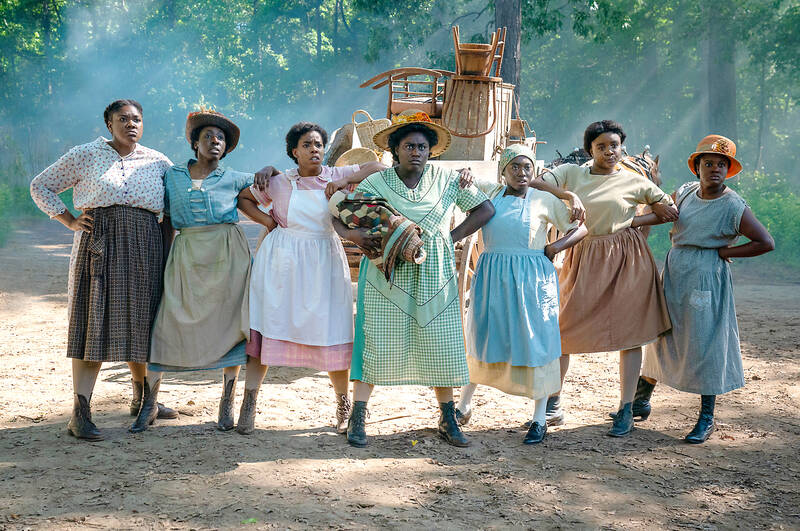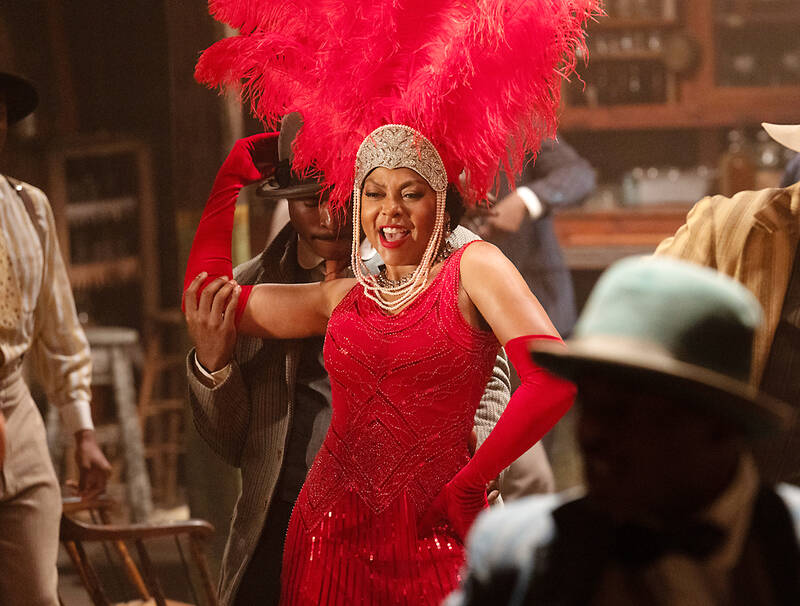It’s not a secret that Fantasia Barrino did not want to play Celie again. The American Idol winner hadn’t had the best time doing The Color Purple on Broadway.
The protagonist of Alice Walker’s Pulitzer Prize-winning novel tells her story of sexual, physical and psychological abuses in the early 20th century South in a series of letters to God. And it was a character she found it difficult to leave behind at the end of the day. Even the prospect of starring in her first major motion picture didn’t seem worth it.
But director Blitz Bazawule had a different vision: He wanted to give Celie an imagination. This Barrino found intriguing.

Photo: AP
“Once she understood the assignment, she quickly agreed,” Bazawule said in a recent interview.
Now, four decades after The Color Purple became a literary sensation and a Steven Spielberg film, the story is on the big screen again. This time it’s a grand, big budget Warner Bros musical starring Barrino, Taraji Henson, as the sultry singer Shug Avery, and Danielle Brooks, reprising her Broadway role as the strong-willed Sofia.
“I’m glad that I didn’t allow my fear of my past experience with Celie, because of where my life was at that time, to hinder me from doing something is great,” Barrino said. “I’m riding on a high right now.”

Photo: AP
Oprah Winfrey is one of several big-name producers on The Color Purple, alongside Spielberg, Quincy Jones and Scott Sanders. Winfrey got her acting break and first Oscar nomination playing Sofia in the 1985 adaptation, before helping Sanders turn it into a Broadway musical 20 years later.
Bazawule was not an obvious candidate to direct this film, however. The multi-hyphenate Ghanaian artist had received acclaim and recognition for co-directing Beyonce’s visual album Black is King. The only other film he had under his belt was the microbudget The Burial Of Kojo, which was made for less than US$100,000.
BLACK MUSIC HISTORY

Photo: AP
But he had ambitious ideas involving large scale musical numbers that would take audiences on a dazzling journey through the history of Black music in America, from gospel to blues to jazz. And, of course, Celie’s inner life. He wasn’t at all sure he would get it, but he knew the story he wanted to tell.
“I thought, if I could just find a way to show the audience how this Black woman from the rural South was able to imagine her way out of pain and trauma it will debunk a myth that is that people who have dealt with abusing trauma are docile and passive or waiting to be saved,” Bazawule said. “If we could just imbue in (Celie) that scale, then that’s the version that needed to exist. Thankfully they said yes.”
They would have to jump through some hoops, however, to secure the kind of budget (reportedly around US$100 million) that they needed to support the vision, including auditioning Henson, an Oscar-nominated actor, and Brooks, who already had a Tony nomination for her portrayal of Sofia.
“We were not the studio’s choices” Henson said. “I just felt some way about having to audition. I’m Academy Award nominated. I had just got finished singing on NBC’s Annie Live. But I checked my ego and I did it. I went in as Shug. I found a dress, had a flower in my hair and faux fur stole and I kicked the door down because I didn’t want them to ever second guess me again.”
For Brooks, it was a six-month process that had her doubting herself. A lot of the people involved in The Color Purple felt the exhaustion of both having to prove themselves yet again, but also wanting to rise to the challenge nonetheless because this film was worth it.
“This is a huge undertaking to be part of,” said Brooks. “This movie is about legacy and it’s what I’ve been calling a cinematic heirloom.”
Her Broadway production was very minimalist and stripped down, so to be on location in Georgia, around Macon, Savannah, Atlanta and the small town of Grantville, was revelatory.
“My world really opened up because I got to use all of my senses,” Brooks said. “I got to explore all of Sofia because now I have a juke joint and I have a dinner table. I have a house. We had a white mob attacking me.”
The juke joint was a real set that required a real swamp to be dredged, where they’d stage Shug’s showstopper, Push Da Button.
“It’s probably the perfect confluence of my amazing technical and creative teams,” Bazawule said.
The film gives a new boldness to Celie and Shug’s relationship with one another and more dimensions to the male characters, including Colman Domingo’s Mister.
And all carry the weight of responsibility not only to the material and its predecessors, but also to future films made with primarily Black casts at this level.
“It’s not the first time I have been in a production of this scale but what matters to me is that it’s a Black production and it’s a production with Black producer, a Black director, predominately Black cast,” Henson said. “It’s like usually we’re supposed to make a dollar out of 15 cents. And after 20+ in the game, it’s like finally the studio trusted us to deliver.”

That US assistance was a model for Taiwan’s spectacular development success was early recognized by policymakers and analysts. In a report to the US Congress for the fiscal year 1962, former President John F. Kennedy noted Taiwan’s “rapid economic growth,” was “producing a substantial net gain in living.” Kennedy had a stake in Taiwan’s achievements and the US’ official development assistance (ODA) in general: In September 1961, his entreaty to make the 1960s a “decade of development,” and an accompanying proposal for dedicated legislation to this end, had been formalized by congressional passage of the Foreign Assistance Act. Two

Despite the intense sunshine, we were hardly breaking a sweat as we cruised along the flat, dedicated bike lane, well protected from the heat by a canopy of trees. The electric assist on the bikes likely made a difference, too. Far removed from the bustle and noise of the Taichung traffic, we admired the serene rural scenery, making our way over rivers, alongside rice paddies and through pear orchards. Our route for the day covered two bike paths that connect in Fengyuan District (豐原) and are best done together. The Hou-Feng Bike Path (后豐鐵馬道) runs southward from Houli District (后里) while the

March 31 to April 6 On May 13, 1950, National Taiwan University Hospital otolaryngologist Su You-peng (蘇友鵬) was summoned to the director’s office. He thought someone had complained about him practicing the violin at night, but when he entered the room, he knew something was terribly wrong. He saw several burly men who appeared to be government secret agents, and three other resident doctors: internist Hsu Chiang (許強), dermatologist Hu Pao-chen (胡寶珍) and ophthalmologist Hu Hsin-lin (胡鑫麟). They were handcuffed, herded onto two jeeps and taken to the Secrecy Bureau (保密局) for questioning. Su was still in his doctor’s robes at

Mirror mirror on the wall, what’s the fairest Disney live-action remake of them all? Wait, mirror. Hold on a second. Maybe choosing from the likes of Alice in Wonderland (2010), Mulan (2020) and The Lion King (2019) isn’t such a good idea. Mirror, on second thought, what’s on Netflix? Even the most devoted fans would have to acknowledge that these have not been the most illustrious illustrations of Disney magic. At their best (Pete’s Dragon? Cinderella?) they breathe life into old classics that could use a little updating. At their worst, well, blue Will Smith. Given the rapacious rate of remakes in modern